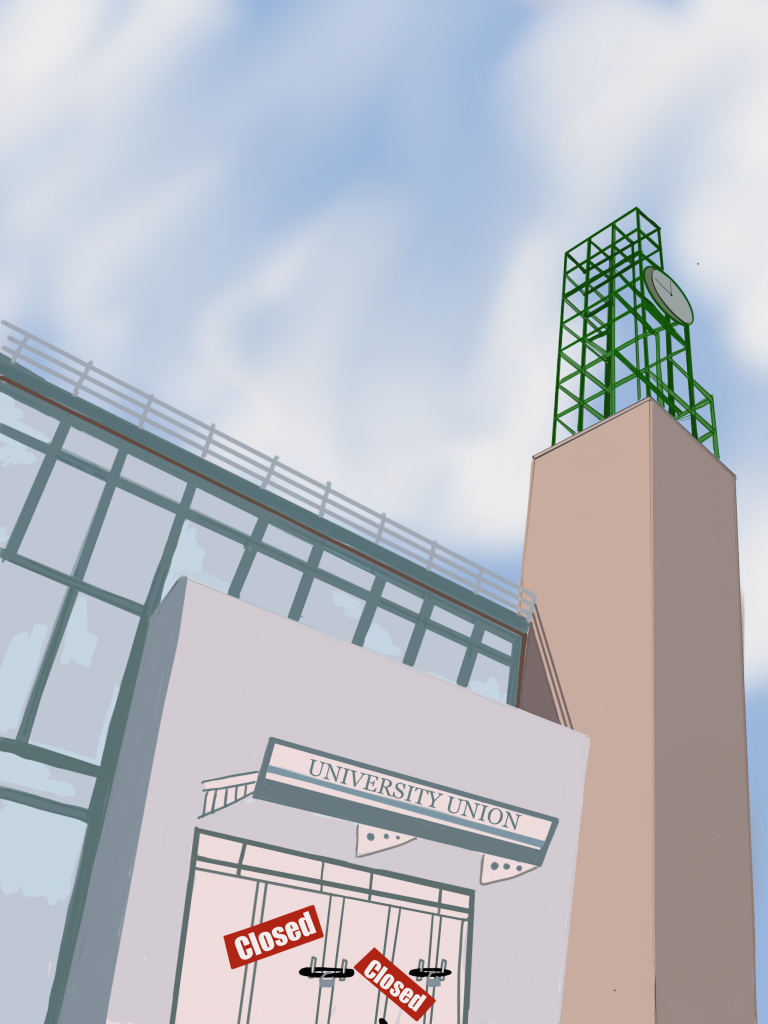On March 30, an unidentified male suspect burglarized the University Union, stealing approximately $200 worth of food items and entering the offices of several student organizations throughout the University Union basement and Tillman Lobby.
The value of the items taken from student organizations isn’t yet known. However, the burglary leads to concerns about security on campus amid the coronavirus pandemic, when many student leaders are away from their offices.
The University Union, as well as most buildings on campus, is still open, despite the fact that all classes at Binghamton University were moved to an online format and the small number of students remaining on campus were consolidated into Hillside Community, Susquehanna Community and Dickinson Community.
This leaves Binghamton University as a whole vulnerable to these kinds of incidents, as the open-to-the-public campus and a severe decrease in student and faculty population makes the University grounds a prime target for theft. The University Union and the Marketplace aren’t the only buildings home to expensive and important equipment used by students and faculty alike, meaning the threat of theft extends to more than just these two locations. Worse yet, should student organization equipment be stolen, there would be nothing that members could do until returning to campus, and even then, replacing missing items may not be an option. In fact, some organizations may not know if their possessions are taken right away — many of the organizations affected by the recent break-in weren’t notified of the incident until a few days later, and it’s unclear when Binghamton’s New York State University Police (UPD) became aware of the incident.
This situation, which may not be the last to occur at BU, has the potential to leave student groups feeling even more vulnerable than they did at the start of the pandemic and may cause many to second-guess their decisions to leave campus — even if they did so for their own safety. While members of student organizations may not own the equipment they use individually, they’ve paid activity fees or fundraised to get what they have, only to feel powerless at the thought of their hard work being stolen from their own spaces. The University should be doing all it can to ensure that all students feel their possessions are not at risk of being stolen or potentially damaged.
University administrators have recognized this need, but their plan doesn’t go far enough. A B-Line news announcement released April 15 stated that effective immediately, “all campus buildings that are not already locked 24/7 will be locked from 5 p.m. to 7 a.m. Monday through Friday, and from 5 p.m. Friday to 7 a.m. Monday on weekends.” During open hours, the University Union will only have one door open to access the building. But there is no way for UPD to patrol such a large campus and each of its buildings consistently, especially amid the coronavirus pandemic, when first responders are facing unusual schedules and potential illness. Therefore, the Editorial Board believes that to promote the safety and well-being of students and faculty, all buildings not currently in use by the student body should be closed entirely, including the University Union and the Marketplace.
Closing buildings on campus down minimizes the risk of burglary and deters thieves from an otherwise easy target. Closing down the Marketplace will also further encourage social distancing guidelines by providing one less place for people to gather and risk the spread of COVID-19. Despite removing seating and changing food orders to takeout only, the Marketplace is just one more place for students to potentially come in close contact and become ill. This measure may also provide more staff and resources for the Chenango Champlain Collegiate Center (C4), which is currently the sole dining hall for students remaining on campus and has run into staffing and supply issues.
BU made a wise choice for student safety by changing class formats and providing refunds to those leaving campus. Now, it must do the same for the property left behind.



